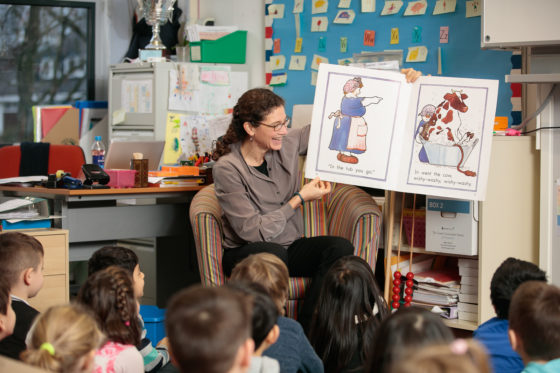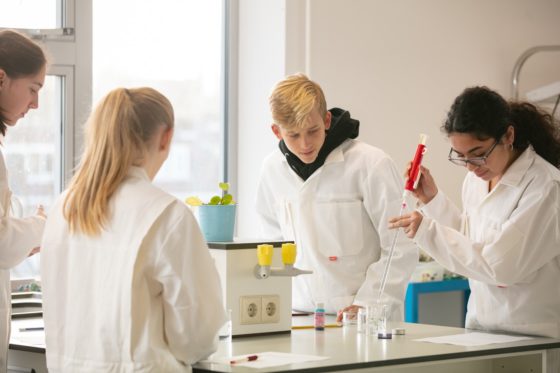Partner content
Nord Anglia International School Rotterdam: experts in helping students settle


Settling into a new school in a new country is not always easy. We talk to Nord Anglia International School Rotterdam to find out how their experienced, friendly approach helps students and parents to feel at home in no time.
From Ecuador to Moscow, Myanmar to Kuwait, Nord Anglia’s 66 schools worldwide are experts in welcoming newcomers to often unfamiliar locations. The recently refurbished Nord Anglia International School Rotterdam (NAISR), which welcomes students aged 3-18 and currently has 260 students on roll, is no different – you know you are in safe hands.
Personalised admissions process
‘From the first moment that parents contact our school, we deliver a very personalised admissions process,’ explains Director of Admissions and Marketing, Jack Fox-Powell. ‘A lot of care is put into growing a relationship with the family, and parents visiting the school will always meet a member of the Senior Leadership Team.’
In a 2019 survey, 100% of parents reported that their first contact with NAISR was positive and welcoming. A big part of this is the school’s long-standing admissions officer, Aurora, whose own children attended the school. ‘She’s such a warm and welcoming part of our school experience and so great at helping new parents,’ says Jack. Indeed, the low staff turnover at the school, with an average tenure of seven years, is a mark of the happy environment there.
Parents have noticed it too. ‘Ever since we first visited the school, … the staff has been extremely welcoming and have built a tremendous sense of community and have welcomed us like family,’ says Ed, who moved to the Netherlands from the US in 2016 and enrolled his daughters in NAISR’s Elementary School.
Local knowledge
Like many families, Ed lives in the tree-lined residential neighbourhood of Hillegersberg, where the school is based. He appreciates the fact that his children can walk or cycle to school, although a door-to-door bus service is provided for students living further afield, such as in Delft or The Hague.
For families who are interested in moving to the area but struggling to find accommodation, NAISR can even send a list of available properties. ‘Because this school is so community-orientated – it’s really the centre of the community of Hillegersberg – we often know about people leaving their house before even the estate agent will,’ explains Jack, who has seen cases of new student families moving into properties vacated by students relocating elsewhere.
As for child care, NAISR shares its site with Funtazia, an English-language day care centre for children aged 3 months to 4 years, offering a convenient solution for working parents with children at the school.

Settling in
The coffee mornings for new families, which take place at the start of each term, also help new arrivals settle in. Here, parents can chat with members of staff and learn more about school life; the school’s broad extra-curricular offer, such as the robotics club, performing arts productions and individual instrument lessons; and the International Baccalaureate programme the students follow. The gatherings are also an opportunity to hear speakers – such as ACCESS, a help service for international newcomers – share useful information about finding your feet in the Netherlands.
For the children themselves, there’s the buddy system, where new students are paired with someone from their class to look after them and show them around. And with an average class size of just 16, the teacher is also well-placed to give newcomers plenty of attention.
Parents can keep up with how the new starts are doing via email contact with the teacher; while the Seesaw app, where the teacher shares class pictures and news, is a handy window on the classroom. Further along the line, checking grades and attendance data is made easy thanks to the school’s online PowerSchool system.
Language support
Another important way that NAISR ensures a soft landing is its excellent English as an Additional Language (EAL) provision. ‘It can be quite confronting when you are dropped into a new country and a brand new language,’ explains head of department Erin Sherritt, who joined the school in 2002 and whose 12-year-old daughter is a student there.
‘I often liken EAL to the relationship with Grandma,’ she says, describing the department as a friendly, safe space, where students and parents – who sometimes also have limited English – can quietly seek advice.
‘When students come in, we assess them, we speak to the parents, and we evaluate their strengths as a student in general – not just in English,’ she explains. ‘I think parents are very happy to know that there’s someone who’s going to support their child when they come here.’
Last year, Erin worked with two Korean girls who spoke no English, using an iPad translator to help them take notes as the teacher was talking to them. ‘Their eyes would light up when they would see me slide in next to them,’ she says.
Much of the EAL support takes place in the classroom to avoid separating the child from their peers, explains Erin, who will also accompany students on field trips or sit with them during assemblies. ‘The students are used to me,’ she says. ‘I often kind of become the second teacher in the classroom.’ And the results are very positive. ‘I am constantly surprised by how quickly children learn English – even in the Middle School,’ she says.

Bilingualism
Vianney, a parent at the school, was impressed by how quickly his French-speaking children picked up English at NAISR. ‘We visited lots of schools, international or French; some of them really big in The Hague,’ he says. ‘Our kids could not speak any English at the time and we thought that the smaller size of this school would make the adaptation easier, so we chose Rotterdam … and we are so glad that we did … Our kids love it … [and] are now completely bilingual.’
With excellent English such an important skill here in the Netherlands, the school has seen an increase in Dutch students, who see bilingualism as a huge bonus. ‘We really value the Dutch community that is slowly growing in our school,’ says Erin. ‘We honour the mother tongue and we always look at English as an additional language. We are adding to what they already have; we are not looking to erase their language or their identity.’
This sensitive support is central to helping newcomers feel at ease. ‘We have such exceptionally caring teachers who really love what they do and value the relationships that they build with students and with parents,’ says Erin. And parents agree, with 100% of respondents saying they felt accepted into a warm and welcoming community. Richa, whose two children have been part of the school for nine years, is a case in point. ‘We have never thought of leaving,’ she says. ‘For both our kids, this is their second home.’
To find out more about the Nord Anglia International School Rotterdam, visit their website or make an appointment to visit.
Thank you for donating to DutchNews.nl.
We could not provide the Dutch News service, and keep it free of charge, without the generous support of our readers. Your donations allow us to report on issues you tell us matter, and provide you with a summary of the most important Dutch news each day.
Make a donation